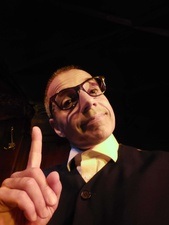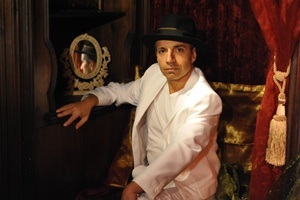In the organizer's words:
Don Quixote de la Mancha
The first book. After Miguel de Cervantes Saavedra
Don Quixote has long been a legend: the knight of the sad figure who, together with his faithful squire Sancho Panza, travels through a long-forgotten Spain on his old nag and experiences one adventure after another. He fights in the name of the declining Order of the Knights Errant against powerful opponents - for justice, honor and pure love.
Adventures in which he has to prove himself as a knight seem to follow him around, because the banality of reality is not the world in which Don Quixote lives. In his world, an inn is a castle and a barber's basin becomes the Mambrin's helmet. Undaunted, he takes on even seemingly overpowering opponents in battle. In his reality, he follows his ideals of heroism and honesty, but his contemporaries, who are stuck in the grim reality, despise and persecute him as a dangerous troublemaker: times he smashes a supposedly huge army in savage battle - and yet only slaughters a herd of mutton, he slits open the "bellies" of giants, but the red stream that pours over him is the wine from huge hoses that he has hacked to pieces and from the fight against rotating swords, which are in reality windmills, he suffers nasty wounds.
But the power of his imagination also makes the reality of the gray present shine and opens up long-forgotten possibilities of play, questioning the boundaries between dream and reality. We have to ask ourselves: do we still give unbound fantasy or even supposed madness a place in our present and, if we accept the disdainful reality as the only truth, are we not much poorer than this "mad" Don Quixote de la Mancha?
Four hundred years have passed since Miguel de Cervantes, in his time-critical novel, one of the first of its kind, told of the beauties, but also the dangers, of illusion in conflict with miserable reality. It is still true today that the imaginative are not alone in the world, but only in our purely purpose-oriented, efficiency-driven society. Cervantes' eventful biography also earned him several years in prison. There, at the age of fifty, he created his world-famous characters and with them a world that was and is always at odds with reality. A vote for the imagination, a vote for the art of living beyond barren realities.
How do we deal with fellow human beings who irritate our lives in such a wonderful way, but also make them richer? Today we call it Quixotesque when someone fights against windmills that become hostile giants. Life is a dream again. And vice versa! These are the imaginary worlds that only a human being can create and that still fascinate us, with all their fantastic craziness, a life so happy and infinitely tragic, but always full of fantasy, that we no longer dare to dream of in our rationalized worlds.
Cast
Based on the translation by Ludwig Tieck.
Text/acting: Jörg Steinberg.
Director: Jörg Steinberg.
Dramaturgy: Holger Kuhla.
Stage/costumes. Heike Neugebauer.
Assistant director: David Wehr.
With: Svea Auerbach, Peter Lüchinger, Michael Meyer, Erik Roßbander, Markus Seuß.
Duration: 2:40 incl. intermission
Performance language: German
Price information:
normal: 25 € reduced: 14 € Students of the University, HS and HfK Bremen and HKS Ottersberg: Free admission















